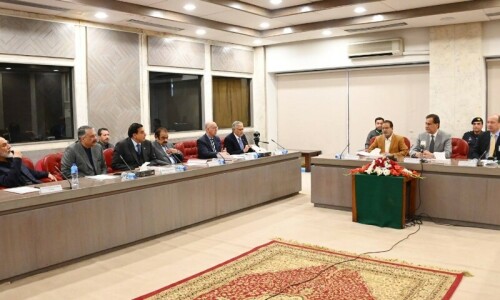ISLAMABAD: After negotiations between the government and PTI hit a roadblock, the former has decided not to form judicial commissions for the May 9 and Nov 26 violent protests, instead proposing alternative options, including the formation of a parliamentary committee to investigate the incidents.
Although the government’s negotiation team did not submit its replies to National Assembly Speaker Sardar Ayaz Sadiq, who heads the dialogue committee, a source privy to the development told Dawn that the government had consulted legal experts and senior lawyers, who advised that judicial commissions could not be formed for cases that had already been decided or were being tried in courts.
Anticipating the government’s position that forming judicial commissions was not feasible, PTI had already boycotted the highly-publicised negotiation process even before the fourth round of talks, which was scheduled for Jan 28.
PTI had made its participation in the fourth meeting conditional on the formation of judicial commissions to probe the May 9, 2023, and Nov 26, 2024 incidents. However, the government decided not to dissolve the dialogue committee until Jan 31 and would wait for the opposition party’s ‘return’.
When contacted, Senator Irfan Siddiqui, the spokesperson for the government’s negotiation team, said the government’s response would remain undisclosed, adding that it was prepared after thorough deliberations and hard work.
“In fact, these are not two but 15 demands of the PTI because both demands (judicial commissions and release of PTI prisoners) have further seven to eight demands in the form of their ToRs (terms of reference),” he added.
Asked whether the government had decided against forming judicial commissions, Mr Siddiqui said alternative options had been proposed, including the formation of a parliamentary committee to probe the May 9 and Nov 26 protests.
“Through our replies, we were hopeful that they would address almost all of PTI’s demands, but unfortunately, the opposition party quit the dialogue process,” he added.
Mr Siddiqui said the government “took this process forward with a lot of patience”, despite PTI’s calls for civil disobedience and aggressive tweets, including attacks on the armed forces and personal abuse of the prime minister.
“We tolerated that,” he said, adding that the onus was now on PTI to approach the speaker to restart the process.
Meanwhile, PTI interim chairman Barrister Gohar blamed the government for the failure of the talks, stating: “It is because of the government that the dialogue wrapped up.”
Another PTI leader, Shibli Faraz, said the facts could have been revealed if the government had formed judicial commissions. “The judicial commission could expose the facts after which the government could not continue for even a day,” he claimed.
Published in Dawn, January 30th, 2025


































